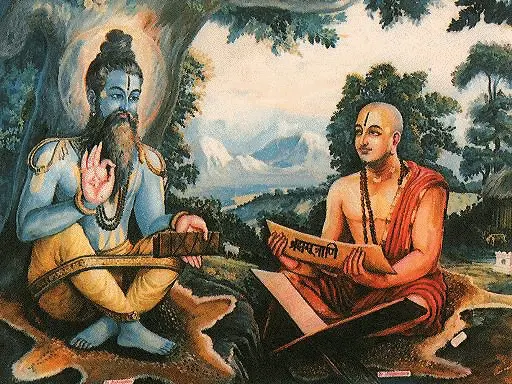Skip to main content
Ideology of Dvaita Vedanta philosophy
Dvaita Vedanta Philosophy

1. Introduction
- Dvaita Vedanta is another sub-school of Vedanta.
- Key question: What is the relationship between Jiva and Brahman?
2. Core Tenet: Absolute Difference
- Relationship between Jiva and Brahman is like A : B - completely different.
- Madhvacharya clearly establishes that the Jiva and the Brahman are entirely separate entities.
-
Jiva is completely dependent upon Brahman.
3. Key Tenets of Dvaita Vedanta (Summarized in Seven Points)
-
Vishnu is Supreme: Vishnu/Hari is the supreme reality and equal to Brahman.
- Theistic form of Vedanta, similar to Ramanujacharya's.
-
World is Real: The world is real (not Maya) unlike Shankaracharya's claims; the differences in the world are real.
-
Five Types of Differences: Madhvacharya highlights the importance of difference by distinguishing five types:
- Difference between Jiva and Ishwara.
- Difference between Jiva and Jagat (everything in the world).
- Difference between Jagat and Ishwara.
- Difference between Jivas.
- Difference between different Jagat entities.
-
Servants of Hari: All Jivas are servants of Hari/Vishnu.
-
Gradation of Beings: There is a hierarchy among Jivas.
- Some are eternally bound to samsara (cycle of birth and death).
- Some are eternally free from samsara.
- Some can enter and leave the samsara cycle.
-
Moksha is Realization of Bliss: Moksha is realizing the natural bliss (ananda) of the self and its true nature.
- Every self has innate properties and ananda.
-
Bhakti is the Path to Moksha: Bhakti (devotion) towards Lord Vishnu/Hari is the path to liberation.
4. The Samsara Chakra (Cycle of Birth and Death)
- How is the Jiva locked in the samsara chakra?
-
Ishwara causes the Jivas to be born in this cycle of samsara to become unaware of the relation between Jiva and Ishwara.
-
Ishwara is the source of being in and out of this cycle.
- Prayer to Ishwara is very important for moksha.
5. Uniqueness of the Jiva
- Every Jiva is unique.
- The purpose of creation is to help Jiva realize its true nature (Swarupa).
- Each Jiva has a unique karma.
- After which the Jiva can realize its true nature.
6. Attributes of Ishwara
-
Ishwara is Saguna - with attributes.
- Pictorial depictions of Vishnu embody this.
7. Realization of Ishwara through Bhakti
- Oneness is not in the Advaitic sense but realizing relation to Ishwara.
-
Bhakti must be aided by karma and jnana.
- Engaging in Vedic rituals and studying Prasthanatraya (Brahma Sutra, Bhagavad Gita and Upanishads).

